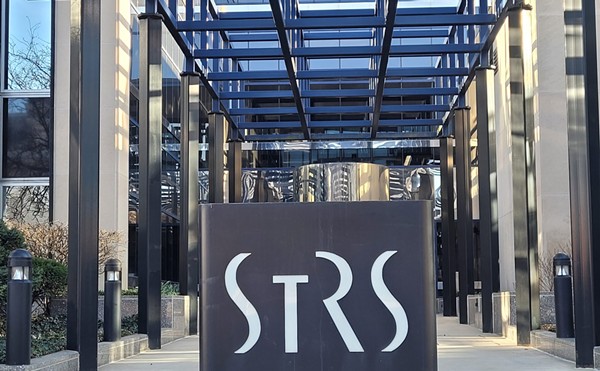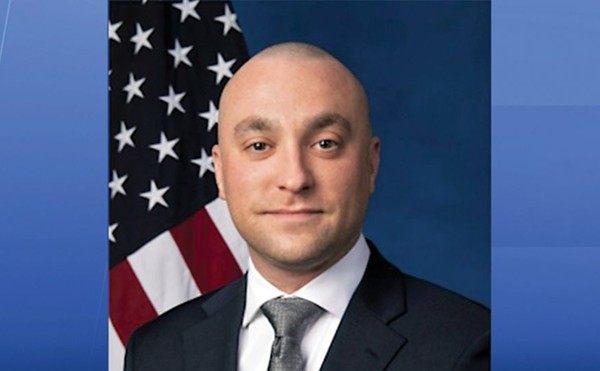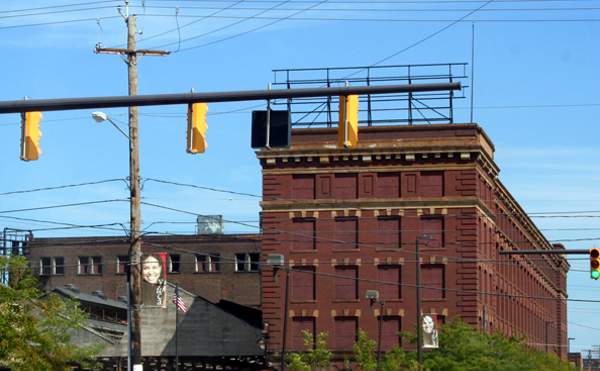In contrast to the restless Wolstein, John McGill sits straight and still on a courtroom bench. McGill, Wolstein's partner in the Heritage Development Company, appears calm, though he occasionally rolls his eyes to express his impatience with the delay. "We could put someone through college for a year in the next four hours," he whispers, imagining the day's legal bills.
Wolstein and McGill spend a lot on lawyers. They are in court this October morning to fight an injunction to block construction of their 600,000-square-foot shopping center in Bainbridge Township. The Attorney General's Office says Heritage defiled Ohio waters when it reduced forested wetlands to naked stumps. Just a month before, the pair endured a two-week trial, only to be hit with a $9 million verdict after a jury decided that they cheated a movie theater chain. And in Parma, Heritage has fought endlessly with homeowners and preservationists to build a Home Depot.
Wherever Wolstein breaks ground, the earth seems to howl. As a breed, developers tend to step on community toes, but Heritage has the effect of turning mild-mannered suburbanites into eco-warriors. "They've just thumbed their nose at everyone," says Aurora resident Benjamin Zaremba, who lives near the Bainbridge site.
It's a common criticism of Wolstein that he does what he wants, city fathers and Mother Nature be damned. Congressman Dennis Kucinich says Heritage thinks it's above the law. "Well, they're going to find out they're not." Even the toothless Ohio EPA has chafed at the company's tactics. One businessman who's butted heads with Wolstein compares him to Al Capone: "As far as I'm concerned, he ought to be indicted on RICO statutes."
Wolstein is 74 years old, but flickers with the energy of a man closing his first deal. He says he's a tough businessman, not a bully. Some deals go smoothly, others don't. The unflattering headlines, he believes, are the sad price a maverick must pay. "In all humility, I draw attention. I drew attention when I was a nobody. I'm a doer. I stand up."
The saga in Parma began two years ago, when city council voted 5-4 to rezone property near Pleasant Valley and Broadview roads. Most of the land was already zoned commercial, but Heritage needed a few extra acres to accommodate its plans for a Home Depot and a Giant Eagle.
Residents protested, calling the shopping center a colossal eyesore. They circulated a petition to put the zoning change on the ballot, but Heritage's attorneys had it rejected on a technicality.
That obstruction removed, Heritage still needed approval to fill about three and a half acres of wetlands. Wetlands are nature's sponges. They control floods, filter pollution, and provide wildlife habitat. According to the Clean Water Act, anyone who fills wetlands, regardless of whether on private or public property, must obtain a permit from the Army Corps of Engineers and the state. Ninety percent of Ohio's wetlands have already vanished.
After Heritage's first proposal was denied, the company sued the U.S. and Ohio EPAs for not enforcing clean-water laws. As it turns out, aging septic systems in Gettysburg Estates, a neighborhood next to the proposed development, leak fecal matter onto Heritage property. To show it really meant business, the company sued the homeowners as well. "Some people got physically ill" when they were served notice, says Jim Amato, one of the residents.
Heritage isn't the first developer whose retail dreams have met resistance. The natives are usually soothed with the donation of new marching band uniforms or a say in the development's design. "Just a little bit goes a long way," says Carnegie Corporation developer Bob Berryhill, who worked for Wolstein for 11 years.
But Heritage, by suing homeowners, chose the iron hand. In August the EPA held a public hearing to consider the company's second wetlands plan. An angry train of elected officials, activists, and residents spoke out against the project. The meeting lasted five hours. Unmoved by the appeals, which included pleas from Kucinich and Parma Mayor Gerald Boldt, the EPA approved the plan, describing it as "unprecedented" in its generosity. In addition to preserving 11 acres of wetlands in Twinsburg and Mantua, Heritage would set aside a nine-acre hiking trail in West Creek Park. "I probably gave away more than I should," McGill says.
That doesn't satisfy many residents, who believe the Ohio EPA cowered before Heritage's fleet of lawyers. "Their resources are virtually unlimited," says Irv Hazel, a West Creek Preservation Committee trustee. "This is what their jobs are -- they develop. They know every law and every loophole."
The irony is, McGill says he refused to let the project die precisely because he couldn't afford to walk away. Close to $800,000 has been spent simply to obtain wetlands permits. "I don't go to his office," McGill says, motioning toward Wolstein's door, "and say, 'How about a million today, a million tomorrow, and a million the next day?'"
McGill feels betrayed by city leaders who, once eager for the development's new taxes, took up pitchforks with residents when they found themselves on the wrong side of the populist fence. Indeed, Mayor Boldt sat on the planning commission that first recommended council approve the change. Now the city is trying to acquire the land through eminent domain. "If we hadn't been led into this, we would have picked up the tent and left," McGill says. A settlement is in the works.
Politicians are known to change course with the winds of popular sentiment. What the case illustrates, more than anything, is Heritage's determination. When the company wants to build something, it moves heaven as well as earth.
For Wolstein, the Parma tussle involves a simple concept: property rights. And the residents who complain the development isn't needed? "It's not their privilege. They don't have a right to say what they need. If you have property, and it's in a classification for a certain thing, you can use it."
Such thinking has borne profits and enemies alike.
Bart Wolstein's office has a manly air. Between an oak desk and a leather-upholstered couch stands a replica of King Tut's sarcophagus. Newspaper articles noting his charity work -- he's given away about $10 million -- and long-shot bid to buy the expansion Browns hang from the walls.
The decor matches his blunt business approach: "We have an idea, we go to the city. If they turn it down, and we think we're right, we go to court. If the court turns us down, we sell our paper to someone else. But if we think we're right, we have to try to prove our point. That's our business."
The son of Russian immigrants, Bertram L. Wolstein grew up on Cleveland's East Side. As a boy, he chased nickels and dimes peddling newspapers on the street and hot dogs at League Park and Municipal Stadium. His father cut fabric in a garment factory. The family moved to Cleveland Heights when he was in the fifth grade, but the Wolsteins could only afford to rent. "I wouldn't call it stark poverty, but his family was poor," says Rabbi Armond Cohen of Park Synagogue, who presided over Wolstein's bar mitzvah.
After graduating high school in 1945, Wolstein joined the navy. He was on a ship to the Pacific theater when the U.S. atom bombed Japan. After the war, he returned home, married a bright woman named Iris, and went to old Cleveland College on the GI Bill. He sold appliances door-to-door and later went to work for his wife's uncle, Sol Shur, a demanding homebuilder who ran him seven days a week. Still, he managed to earn a law degree, taking night classes at Cleveland State.
Wolstein worked for Shur for six years before opening a law practice downtown. The law didn't provide enough money for Wolstein to raise his growing family, so he turned his eyes to developing land. "I literally built Twinsburg," he says, with a brusque immodesty that is his custom.
In 1965 Wolstein formed Developers Diversified with Kenneth and Howard Young of the Hannan Construction Company. Hannan had built a number of Kmarts, and the Young brothers wanted to get in on the development side. Developers Diversified proceeded to build 100 Kmart-anchored strip malls from the Dakotas to Maine. In the '70s, DD began building shopping malls. By the late '80s, the company hitched its bulldozers to Wal-Mart. One Young brother had died, and Wolstein bought the other out.
"He's a very good businessman," says Eugene Faigus, Wolstein's son-in-law, who worked for DD in the '70s and now lives in Chicago. "He's a very knowledgeable and well-principled man, who believes in fairness and will fight for it."
In 1993 a tight lending market steered DD to go public. Two stock sales raised $298 million, but deprived the company of its intimacy; it now answered to a board and stockholders, not the visions of its self-made founder. Wolstein retired as DD chairman in 1997 and created Heritage Development. When he entered the cattle call to buy the new Browns in 1998, his net worth was an estimated $150 million.
Wolstein's profile grew with his wealth. In the mid-'70s Governor Rhodes appointed him a trustee of Cuyahoga Community College. He also considered buying the Cavaliers; instead, in 1979, he spent $25,000 to buy the Force, a year-old Major Indoor Soccer League team. "I looked at a film and said, 'Jesus Christ, this is a good game,'" he remembers.
The Force became an attraction; for four straight seasons, the team drew more than 12,000 fans a game to the Coliseum. Wolstein wasn't the typical hands-off owner; he was involved to the point of obsession. After a bad loss, he might berate the coaches in the locker room, and he once threatened a libel suit when an opposing coach suggested the Force played dirty. His behavior drew comparisons to George Steinbrenner.
"Bart is a very strong-willed individual who does everything first-class, and he expects his employees to follow through with that," says Paul Garofolo, the Force's assistant general manager. Wolstein folded the franchise in 1988, when the league was on the brink of collapse. Garofolo is now president and general manager of the Crunch, the team that rose from the Force's ashes, but hasn't matched its popularity.
The Force made Wolstein a public figure more than any shopping mall could. At games, fans sought his autograph, and he delighted in the attention. But the spotlight didn't always cast a favorable glow. A 1982 Cleveland magazine profile depicted Wolstein as less than magnanimous. "As his net worth increased, his people sensitivity decreased," a former employee was quoted as saying. "Bart won't help anyone who hasn't helped him," added an insider at the Jewish Community Federation.
The article hurt Wolstein. He hired a public-relations firm and implored friends to write letters to the editor in support. Rabbi Cohen describes Wolstein as "sensitive." Asked if that means Wolstein feels he doesn't get the respect he deserves, Cohen answers, "I think that's possible. He's never said that to me, but I think that's possible."
Wolstein's allies say he is demanding and blunt, but fair and honest. "He does what he says, and he says what he does," says fellow developer Sam Miller, co-chairman of Forest City Enterprises. Adds Andrew Randall, chairman of Firstar of Northeast Ohio: "If you need something from him and he can do it, he will."
Wolstein can be generous, and he's not shy about drawing attention to his good works. For $1.5 million, his and Iris's names were attached to the victory bell that rings after Ohio State football victories. The United Cerebral Palsy Center on Euclid Avenue is also named for the couple. Wolstein recently spoke on the phone with Bob Dole, who, with President Clinton, is leading a scholarship drive for the families of September 11 victims. They talked about holding an event in Cleveland to raise money for the fund. "That's the kind of thing we do, and they waste my time with this garbage," he says, waving a hand at the stack of wetland maps and EPA correspondence.
But even those who respect Wolstein see a self-absorption that sometimes leads to paranoia and pettiness. "He's a lonely person, which is unfortunate," Berryhill says. "His friends he sometimes perceives are his enemies."
As art dealer Mitchell Shaheen settles onto a couch, his dogs circle their floor cushions and drop. Shaheen rescues greyhounds that outlive their usefulness to racetracks. He can be seen walking the gentle creatures outside his Superior Avenue gallery four at a time.
Shaheen met Bart Wolstein on the tennis court in the early '80s. The developer expressed an interest in collecting art, and Shaheen went to work on his behalf. He once paid $2,400 to have a nine-foot Richard Diebenkorn painting shipped from a private collection for Wolstein to view. Wolstein, though, never looked at the work, and Shaheen shipped it back at his own expense. "He didn't want to see it," Shaheen says. "He was afraid to write the check."
Eventually, Shaheen was able to convince Wolstein to part with his money. His purchases for single pieces climbed into six figures.
Then, in 1993, Wolstein had his collection appraised. He wasn't happy with the quote. "In my opinion, I bought stuff that I thought would hold at a price, and it became half that price by the end of it," he says. "I became suspicious." In fact, Wolstein says, an appraiser told him one piece Shaheen procured, a painting by Spanish surrealist Joan Miró, was a forgery. Wolstein abruptly sued Shaheen for $4 million, charging fraud and negligence.
Shaheen was devastated by the accusation. He believes Wolstein overreacted to what was then a bear art market. Wolstein demanded Shaheen buy back the art he had sold him, plus 10 percent, the art dealer says. But Shaheen refused to admit he had failed or cheated his client. "There was nothing in that collection I wouldn't have bought myself. There was no way I was going to settle."
The case went to trial in 1996. Shaheen's witnesses testified that the Miró was genuine, and that Wolstein had actually gotten a few bargains. They appraised two pieces at $1.25 million, when Wolstein paid $845,000. The jury ruled in Shaheen's favor; Wolstein received nothing.
"I went to court, and the jury didn't agree with me," Wolstein says, shrugging his shoulders.
Shaheen emerged with his reputation intact, but not without a price. "I lost two or three years of my life," he says.
"That's the way Bart Wolstein operates," says Florida developer Robert Kurlander. "He just does what he wants to do and figures he has enough money and power to do that."
For a time, Kurlander was Wolstein and McGill's exclusive broker in parts of Florida. In 1990, when Wal-Mart asked Wolstein and McGill to scout locations in Northeast Ohio, they assigned Kurlander the task. Wal-Mart eventually bought a property owned by Wolstein and McGill, and Kurlander believed he was due $106,000 under the terms of their Florida agreement. But Wolstein and McGill refused to pay, and in 1993, Kurlander sued. A jury awarded him the money.
Wolstein and McGill eventually won an appeal on what amounts to a technicality. By a 2-1 vote, the judges ruled that Kurlander was ineligible to recover a commission because he was not a licensed broker in Ohio. McGill says Kurlander was due only the money for developing a Wal-Mart program; any land sale wasn't his concern. "At the end of the day, we paid him $50,000. And we didn't have to pay him $50,000."
Kurlander, however, is still sour: "I used to defend Bart Wolstein. I've known him for many years. Now, I don't think much of him."
Perhaps no businessman succeeds without a little dirt collecting under his fingernails; the line between "tough" and "ruthless" can blur. The jury that dropped a $9 million verdict on a Wolstein/McGill development, for example, appears to have been so confused.
In 1995 Regal Cinemas signed a lease to operate a movie theater at Macedonia Commons, which was being developed by Wolstein and McGill. The agreement allowed for either side to terminate if permits were not obtained by a certain date. The date arrived, but the permits were slow in coming. Wolstein and McGill opted out of the deal.
Regal didn't question the decision -- at first. Only when Cinemark began negotiating for the site more than a year later did Regal ask about the status of the permits. Wolstein and McGill eventually signed with Cinemark, and Regal filed suit, claiming fraud, negligent misrepresentation, and breach of the lease and an implied duty of good faith. Regal said the developers knew they would be unable to obtain the permits by the void date. "It was a reckless statement," Regal attorney Mark Wallach says.
In 1999 U.S. Judge John Manos granted Wolstein and McGill a summary judgment. No reasonable jury, he ruled, would conclude they made promises without intending to keep them. The evidence does indicate they worked to get the permits on time; at one point, an environmental consultant hand-delivered an application to the Army Corps of Engineers in Buffalo.
Yet when Manos's decision was reversed on appeal and kicked back to his court, a jury found for Regal. McGill believes the jury, in its hurry to adjourn before the Labor Day weekend, didn't weigh the evidence thoughtfully. He is confident they will prevail on appeal.
The $9 million verdict fits within the Wolstein-as-predator narrative, but the facts tell a different story: Even when Wolstein is right, he finds a way to look like a jackass.
John McGill eases his black BMW into Barrington, a gated community Heritage built in Aurora. A Jack Nicklaus-designed golf course weaves behind estate lots and homes that begin at $530,000. Indians slugger Jim Thome lives here. A stockbroker is building a house with an eight-car garage. The street names -- Winchester, Devonshire, Bradmore -- are meant to evoke the English countryside.
McGill, 47, started working for Wolstein when he was 14, making 50 cents an hour clearing debris at construction sites. The son of a tire salesman, he ultimately ascended to the vice presidency of Developers Diversified. He and Wolstein also developed projects through a side company called W&M Properties.
After DD went public, McGill, like Wolstein, missed the feel of a private company, so he left DD and joined Wolstein as a 50-50 partner at Heritage. With his soft blue eyes, neatly trimmed mustache, and calm demeanor, McGill is the subdued grinder to Wolstein's imperious chieftain. "He's treated me as a father and, in many respects, better than my father," McGill told a reporter when he joined Heritage.
Heritage has overseen a variety of projects, from Barrington to the Bertram Inn & Conference Center in Aurora to the glass-and-granite Renaissance building at Playhouse Square. And, of course, Heritage builds shopping malls.
The bulk of the Parma site was already zoned commercial, and Heritage has argued that something was going to be built there. But as the circumstances merit, the company just as easily takes the other side.
In Willoughby Hills, Heritage wants to build a 500,000-square-foot mall off SOM Center Road near I-90 and 271. It obtained options to purchase the land from all but two property owners. The area is zoned residential, but Heritage has decided the proximity to freeway overpasses and a five-lane road does not a neighborhood make. "It's not really conducive to that type of use," McGill says.
Heritage petitioned to put a zoning change on the ballot, which city council rejected. Heritage and the property owners who agreed to sell then filed suit, but a Lake County judge ruled in November that the city was within its rights. Heritage will appeal. McGill shrugs off a suggestion that it's hypocritical for Heritage to thwart a citizens' movement in Parma and then stage one in Willoughby Hills. "That's the way the game is played," he says.
The strangest game is being played in Bainbridge Township.
In September 2000, Heritage bought property on Aurora Road to build a huge shopping center. The site, near Six Flags Ohio, contains wetlands, some of which Ohio EPA surface-water specialist Dan Osterfeld judged to be Category 3 -- the highest quality. He told Heritage it would be difficult for the company to receive permits to tamper with such precious soil.
With a dozen signed leases in hand -- including Wal-Mart, Kohl's, and Home Depot -- and $11 million invested, Heritage was antsy to complete construction. "They were hell-bent about getting that thing done," says zoning inspector Frank McIntyre. But the Ohio EPA hadn't issued a permit, and one didn't appear forthcoming.
So Heritage came up with a solution: Cut the trees, but don't touch the soil. When the excavation crew approached the wetlands, it used a machine with a claw that could reach in and pluck the trees away. "I had a right to do it," Wolstein says. "I had the right from Geauga County, I had the right from the Army Corps, and the EPA has no jurisdiction over trees."
The Army Corps and Geauga County had signed off on the project, but it seems more accurate to say they weren't in a position to tell Heritage it couldn't cut the trees. "The developer knows what we do and do not regulate," Army Corps senior biologist Alan Anacheka-Naisman says. "He has, in the federal government's view, the right to log his property." While the Army Corps had granted Heritage a wetlands permit, it was provisional on the state's permit. Project manager Alan Bellis later testified that he was warned by Geauga County that, without a permit from the Ohio EPA, Heritage may be in violation.
On July 2, Osterfeld learned the cutting was under way and informed his supervisor, Ric Queen. A week later, Queen and Ohio EPA Director Chris Jones inspected the site. Jones wrote a memo to Governor Taft the next day, describing the cutting. Heritage was "literally daring us to do something about it," Jones wrote. He formally denied the company's proposal to fill the wetlands on July 26. (Heritage is appealing.)
Today, two wetlands and portions of two others are "just fragments on the landscape," according to EPA ecologist John Mack. Another EPA ecologist, Mick Micacchion, says he saw tire tracks and fill dirt pushed into a wetland.
The state filed suit against Heritage in August for failing to obtain a permit and failing to protect wetlands. During the injunction hearing, Judge Forrest Burt frequently reminded the attorneys his only concern was whether Heritage's actions polluted the state's waters. Despite Burt's admonishments to stay on task, it took three days to plow through the evidence. Late in the afternoon of the final day, the flinty Burt had to be coaxed from his chambers to hear one more witness.
The state argued that, by removing the tree canopy, Heritage turned prized wetlands into common ones, where woodland frogs and salamanders will make way for the invasive purple loosestrife. Heritage said the wetlands are different, but not necessarily worse. Its consultant, aquatic biologist Cynthia Paschke, testified the wetlands are "emergent" instead of "forested." She also said the wetlands will better retain water, since they won't be feeding tall trees. Judge Burt's decision is imminent.
As ludicrous as some of Heritage's arguments might sound, the company doesn't defend itself with a wink and a sly grin. As in Parma, Heritage feels unduly burdened by the EPA. McGill wonders what makes the seven acres of Bainbridge wetlands unique. He says Six Flags and Signature of Solon Golf Course, which neighbor the Bainbridge site, got permits to fill their wetlands. Heritage is offering to set aside 4.2 acres of wetlands for every one it destroys, to say nothing of the $1 million in taxes for Kenston schools and the 900 jobs the center will create. Home Depot, McGill notes, pays $11 an hour.
Still, why couldn't Heritage wait? It's a question Wolstein is tired of answering: "All you guys say the same thing, 'Why didn't you wait? Why didn't you wait?' Wait for what? 'Wait for the permit.' I'm waiting for the permit. 'Well, why did you cut the trees?' I cut the trees because we cut trees all the time. There's no law against cutting trees. That's how you build this country. You cut out trees so you can build."
The Ohio EPA's friendliness to business has earned it the nickname Every Polluters' Ally. Hence, it seems odd that it would suddenly pick a fight with a developer. Wolstein believes it's retribution for Heritage's tactics in Parma. "They'd never give us a permit if we didn't pin them against a wall."
Heritage is reviled not only for its methods, but for what it builds: big-box shopping centers. In addition to Bainbridge Township and Willoughby Hills, the company has its eyes on Brecksville, Chardon, and Wadsworth. Wolstein has all but given up on Cleveland. He owns significant property on the East Bank of the Flats, but he's shelved plans for taking the riverfront upscale until the city cleans it up. "If a guy wants to build a nice restaurant, you can't have it next to a spot where teenagers are getting drunk."
So he develops largely in suburbia. The anti-sprawl bumper sticker that reads "Leaving town? Take a developer with you" seems to have been written with men like Wolstein in mind.
Both Wolstein and McGill are, in their own way, sensitive to criticism. McGill has personally written those who've fired off angry letters to the editor about Bainbridge, trying to explain Heritage's position. "I felt bad about it," he says.
Wolstein, on the other hand, tends to bark back. In August he shared a breakfast table at Barrington Country Club with member Kenneth Dixon. Dixon said that he casually mentioned reading an article about Heritage cutting down the Bainbridge trees. McGill, who was at the table, says Dixon made a number of comments he felt were out of line. Whatever the tone of the conversation, two days later, as Dixon reached the 16th hole, a golf pro handed him a letter from Wolstein asking that he apologize, or his membership would be terminated. Dixon refused, and his initiation fee was returned.
A similar scenario played out when Bertram Inn's director of building operations faxed a letter to the Ohio EPA, stating his opposition to the Bainbridge development. The employee, James Gieseler, unwisely used the inn's stationery and fax machine. After Wolstein questioned Gieseler, he fired him. Gieseler is now suing Bertram and Heritage for $25,000.
Wolstein is not a man of nuance; he's a man of absolutes, with little room for gray areas and middle grounds. "All in all, Bart's a nice guy," says one man who's worked with him. "But he can be a real asshole."
Wolstein is asked the question put to Rabbi Cohen: Does he feel he hasn't gotten the respect he deserves?
"Absolutely not."
Why?
"I don't know. Because I'm a maverick. I just go about my life and do it, and I just don't care. People that are nice, I'm nice to. People that aren't nice, I avoid."
But you do seem to care what people think.
"No, I don't. I care if you write trash. But I'm respected by tons and tons of people, and that's enough for me. People that don't like me because I'm successful, I don't really care about. I look at myself in the mirror . . . and I'm real happy with myself."












